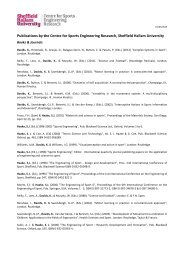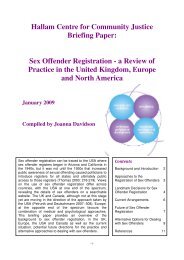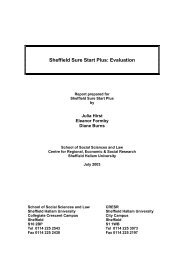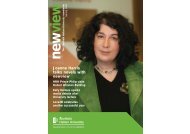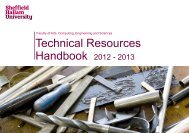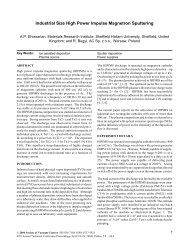The exercise of judicial discretion in rent arrears cases - Sheffield ...
The exercise of judicial discretion in rent arrears cases - Sheffield ...
The exercise of judicial discretion in rent arrears cases - Sheffield ...
You also want an ePaper? Increase the reach of your titles
YUMPU automatically turns print PDFs into web optimized ePapers that Google loves.
3. Interviews with district judges<br />
Interviews were carried out with 26 district judges. Judges <strong>in</strong> the three geographical areas<br />
were approached through the District Judges Association, and asked to take part <strong>in</strong> the<br />
research. Judges were free to refuse. Interviews lasted between one and two hours and<br />
were recorded and transcribed.<br />
<strong>The</strong> <strong>in</strong>terviews were structured <strong>in</strong>to two broad parts. <strong>The</strong> first part drew on a semi-structured<br />
questionnaire around a number <strong>of</strong> key topics about the judge’s background experience; their<br />
approach to decision-mak<strong>in</strong>g <strong>in</strong> possession <strong>cases</strong>; their views about procedure and external<br />
factors (<strong>in</strong>clud<strong>in</strong>g hous<strong>in</strong>g benefit); the impact <strong>of</strong> landlords and their representatives; and the<br />
impact <strong>of</strong> tenants and their representatives; f<strong>in</strong>ally, they were asked about warrants <strong>of</strong><br />
possession. This part <strong>of</strong> the <strong>in</strong>terview was designed to elicit <strong>in</strong>formation about the <strong>in</strong>fluences<br />
on decision-mak<strong>in</strong>g, for example from their tra<strong>in</strong><strong>in</strong>g to the k<strong>in</strong>ds <strong>of</strong> considerations about<br />
‘repeat players’ which are mentioned <strong>in</strong> the literature (see further Chapter 5, below). (See<br />
Appendix 2 for the <strong>in</strong>terview schedule.)<br />
<strong>The</strong> second part <strong>of</strong> the <strong>in</strong>terview <strong>in</strong>volved the presentation <strong>of</strong> scenarios to the judges to<br />
gauge their responses to them, the order they would make <strong>in</strong> that case on the basis <strong>of</strong> the<br />
facts provided <strong>in</strong> the scenario, and their explanations for mak<strong>in</strong>g that order. <strong>The</strong> scenarios<br />
are set out <strong>in</strong> Appendix 2, and also <strong>in</strong>cluded at relevant po<strong>in</strong>ts <strong>in</strong> the report. This part <strong>of</strong> the<br />
<strong>in</strong>terview was designed to overcome the problem, anticipated by the research team, that<br />
district judges would not feel able to talk about specific <strong>cases</strong>. <strong>The</strong> scenarios were<br />
developed, then, to reflect the run-<strong>of</strong>-the-mill, ord<strong>in</strong>ary possession case with a number <strong>of</strong><br />
variations reflect<strong>in</strong>g variously <strong>in</strong>creased vulnerability <strong>of</strong> the occupier, issues with hous<strong>in</strong>g<br />
benefit, technical problems with non-<strong>rent</strong> expenses, possible variations on the worth<strong>in</strong>ess <strong>of</strong><br />
the occupier.<br />
In order to prepare these scenarios, a focus group compris<strong>in</strong>g a mix <strong>of</strong> senior practitioners<br />
and district judges was held. A number <strong>of</strong> potential scenarios were developed prior to the<br />
focus group be<strong>in</strong>g held which were then further ref<strong>in</strong>ed and developed follow<strong>in</strong>g the<br />
feedback from the focus group. <strong>The</strong> response <strong>of</strong> the district judges to these was very<br />
positive, <strong>in</strong> that they commented that they were very “familiar” and reflected similar <strong>cases</strong><br />
which they had recently encountered.<br />
Given the qualitative nature <strong>of</strong> the <strong>in</strong>terviews we have generally not. <strong>The</strong> earlier focus<br />
groups suggested that there would be a range <strong>of</strong> attitudes from judges and this was borne<br />
out by the <strong>in</strong>terviews, and it seems <strong>in</strong>appropriate to try and ascribe any numerical<br />
5



